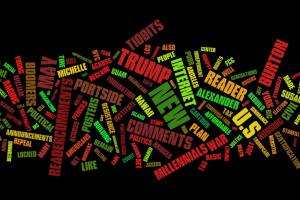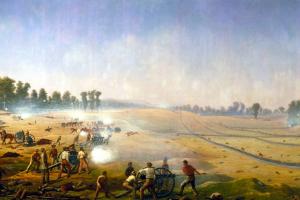American Slavery: Separating Fact From Myth
The Conversation
 Reader Comments: Trump, Sessions, Pence, Impeachment - Readers Debate; Resistance Ballot Box Victories; Racism, Lynching, Slavery, Removal of Confederate Symbols; Israel; Palestine; Saudi Arabia; Puerto Rico; 2017 People’s Summit; New Resource to Protect Medicaid and Health Equity; Great News from Workers Independent News; and more...
Reader Comments: Trump, Sessions, Pence, Impeachment - Readers Debate; Resistance Ballot Box Victories; Racism, Lynching, Slavery, Removal of Confederate Symbols; Israel; Palestine; Saudi Arabia; Puerto Rico; 2017 People’s Summit; New Resource to Protect Medicaid and Health Equity; Great News from Workers Independent News; and more...
 Reader Comments: GOP Health Plan = Death Squads; Trump Tax Plan - More for the Rich; It Could Have Been Me (protests then and now); Locked Up for Being Poor; Politics of Questioning the Civil War (and the end of Slavery); Time to Save Net Neutrality;
Announcements: Building Bridges Across the Generation Gap: Shared Struggles; Michelle Alexander and Susan Burton; Posters - Reclaim! Remain! Rebuild: Affordable Housing, Gentrification & Resistance; and more...
Reader Comments: GOP Health Plan = Death Squads; Trump Tax Plan - More for the Rich; It Could Have Been Me (protests then and now); Locked Up for Being Poor; Politics of Questioning the Civil War (and the end of Slavery); Time to Save Net Neutrality;
Announcements: Building Bridges Across the Generation Gap: Shared Struggles; Michelle Alexander and Susan Burton; Posters - Reclaim! Remain! Rebuild: Affordable Housing, Gentrification & Resistance; and more...
 "Donald Trump's greatest threat to our society and to our democracy is not necessarily his authoritarianism, but his essential ignorance—of history, of policy, of political process, of the Constitution. Saying that if Jackson had been around we might not have had the Civil War is like saying that one strong, aggressive leader can shape, prevent, move history however he wishes. This is simply 5th grade understanding of history or worse." David Blight, Yale historian.
"Donald Trump's greatest threat to our society and to our democracy is not necessarily his authoritarianism, but his essential ignorance—of history, of policy, of political process, of the Constitution. Saying that if Jackson had been around we might not have had the Civil War is like saying that one strong, aggressive leader can shape, prevent, move history however he wishes. This is simply 5th grade understanding of history or worse." David Blight, Yale historian.
After Housing and Urban Development Secretary Ben Carson refers to African slaves as "immigrants," Trevor gives him a lesson in semantics.
Spread the word